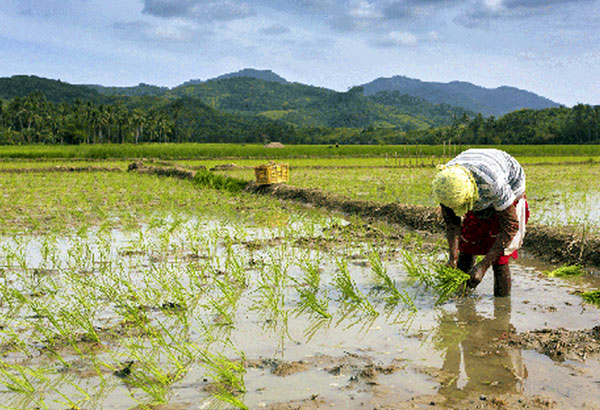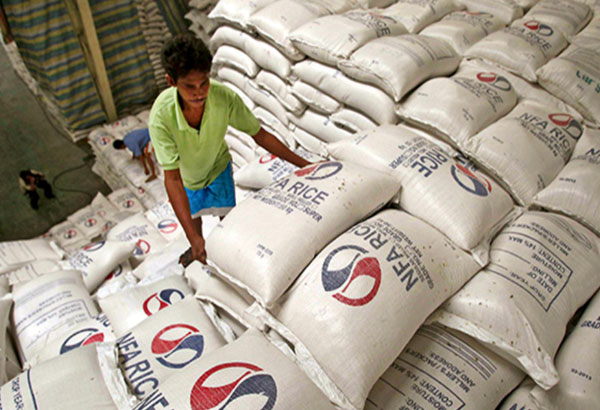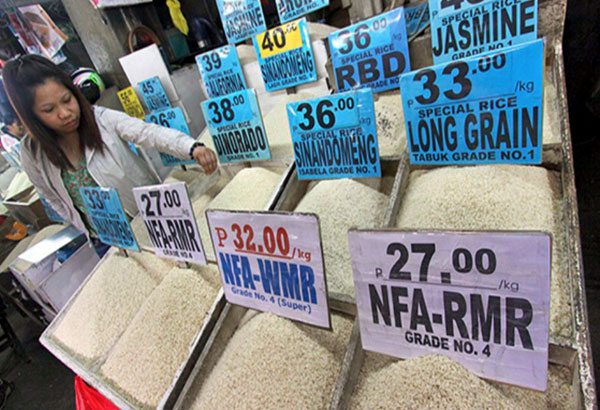The politics of food security
 The Official Gazette
The Official GazetteIn the free-trade world, small countries like ours have little economic or geopolitical power. However, the fast-approaching regional economic integration of ASEAN finds the Philippines’ battle against national inequality stalemated by food-price inflation (http://www.philstar.com:8080/opinion/2015/03/16/1433983/inflation-eating-our-lunch). Despite our best efforts, poverty continues to make gains. The inflationary price pressures of food staples that are widely grown in this country force us to look more closely at food security here at home while free-trade issues are being negotiated with our ASEAN neighbors.
The Food and Agriculture Organization (FAO) simply says that a country has food security when “all people, at all times, have physical and economic access to sufficient, safe, and nutritious food to meet their dietary needs and food preferences for an active and healthy life.” It says nothing of where the food comes from.
Using this FAO definition, food security can be accomplished in two inter-related ways: through adequate food supplies and, equally important, access to food supply. It is not uncommon for a country to have more than enough supply of food, but because of high prices and low income, people are unable to gain access to food, thus creating a sense of uncertainty.
Our present approach to food security, however, has tended to stress domestic production for the sake of achieving self-sufficiency, which would free us from the need to import additional food. With our colonial agrarian history, the idea of self-sufficiency has great popular appeal and a patina of “common sense.” But given the recent changes in the world economy, to what extent does this nationalist wisdom still make sense?
Globalization and the imperatives of ASEAN integration have been pushing us forcefully in the direction of agricultural trade liberalization. In what ways does trade liberalization impinge on the problems of food security, understood as supply and access rather than self-sufficiency itself?
According to National Economic Development Authority (NEDA) Secretary Arsenio Balisacan, the problem of food security stems from the policy of “Quantitative Restrictions” (QRs): the protectionist practice of limiting rice imports beyond a certain amount of tons in order, supposedly, to protect local farmers. Such policies, in fact, produce the opposite effect by limiting access to rice, the single most important food item among Filipinos. As numerous studies have shown, “adopting a QR regime on rice has been anti-poor, anti-equity, anti-growth, and anti-development,” Balisacan observes.
 philstar.com
philstar.com Indeed, a government think tank, the Philippine Institute for Development Studies (PIDS), has shown that a liberalized trade regime for food security is the more appropriate policy. Consumers would then be able to buy less expensive rice from Thailand and Vietnam. The Institute even recommended that QRs for rice should not be renegotiated for extension; that rice should be fully deregulated. The replacement of QRs with tariffs would bring the government additional revenues.
This sounds fine for the population in general, but what about the nation’s rice farmers?
The Department of Agriculture (DA) and the National Food Authority (NFA), the two agencies dealing most directly with rice farmers, seem to support instrumental tweaking of present programs rather than the outright abolition of import restrictions and the import monopoly of the NFA. Small farmers, for their part, contend that even present programs don’t go far enough toward meeting their real needs. Furthermore, they fear losing the NFA support they currently have.
PARAGOS-Pilipinas—an organization representing small rice producers—questions the proposal to abolish QRs, saying that they stand to lose their livelihoods if this pushes through. Chair Jimmy Tadeo argues, “The proposal to abolish restrictions would spell the demise of the local rice industry. As it stands, rice farmers are able to sell their palay at competitive prices without fear of having to compete with highly subsidized cheap rice imports. This is because the NFA has the sole authority to import rice from the global market. The NFA also has the policy of importing rice only during periods of underproduction or shortage. As such, small rice farmers during harvest season do not have to face the deluge of cheaper imported rice.”
“More importantly,” he adds, “the palay support price is the only government support that offers direct benefits to small farmers. If this is removed, they will suffer huge losses and become indebted.”
Rural women are also raising concerns. Ka Trining Domingo, Katipunan ng Babaeng Pilipina (KABAPA) National President and Pambansang Koalisyon ng Kababaihan sa Kanayunan (PKKK) Honorary President says, “Women rice farmers will also lose their livelihoods if the NFA restrictions are abolished. Women farmers continue to benefit from the P17 per kilo price support provided by the NFA. Families also benefit from the low P23 to 27 per kilo selling price of NFA rice. Instead of abolishing the NFA, government must provide more funds for palay procurement to support rice farmers, while at the same time keeping the prices of rice affordable.”
“If you ask the women farmers,” Ka Trining continues, “they have very little rice to harvest even without natural calamities because of the lack of government support services such as capital, seeds, irrigation, and technology. For instance, the CARPER Law provides that government will allocate initial cash grants to farmer-beneficiaries for agricultural production. However, the Department of Agrarian Reform has not implemented this provision of the law.”
While both these arguments are compelling, they deserve to be looked at in terms of the bigger picture. In the first place, QRs on imports mean that the NFA becomes the single most powerful buyer and seller of rice itself. Its role as rice import monopolist gives us pause as it places enormous power in the hands of a single government agency. In addition, the DA’s record of spending and ability to meet deadlines has been fairly problematic in recent years.
But the difficulties of rice farmers also have other sources. Two problems stand out: local rice cartels and smuggling. Cartels continue to profit from the rice trade by manipulating their selling price. They do so by hoarding supplies, thereby triggering price increases. Indeed, economic sabotage can happen at several levels throughout the supply chain by traders, millers, wholesalers and retailers. Cartels, in effect, re-double the QRs on rice, further widening the gap between food supply and access to that supply, especially by the poor squeezed by the rise in prices. Until the cartels are dismantled, rice prices and poverty will remain significant socio-economic problems. “The curse of the middleman” has held its grip on farmers from time immemorial, and is still one of the most poorly-regulated businesses in the country.
Smuggling is the other big problem. Foreign rice brought in without paying an import tariff creates negative price distortions that undercut local prices, adversely affecting the livelihood of small rice producers. Current law dictates that smuggled rice be disposed of (or returned to) its port of origin. In time of need and high prices, such action can certainly rankle, as seen in 2013 in Davao, where a court ruled against the Bureau of Customs and ordered the release of 4.2 million tons of seized smuggled rice.
Balisacan points out that smuggling is in large part produced by the very policy of quantitative restrictions. “Because the QR regime has pushed domestic prices high relative to world market prices, smuggling has become quite attractive. Ironically, without the smuggled rice, domestic rice prices could have actually been higher—food price inflation could have even been higher, poverty could have risen even more.”
NEDA agrees, however, that much is to be done for the rice sector to recover from underproduction. While it will take time to repeal the law related to QRs and rice importation, Balisacan said that the government “needs to be vigilant in monitoring the supply and demand of rice. We have to find a way to reduce upward price pressures on food.”
NEDA also recommends that the government focus on initiatives to increase rice farmers’ income rather than just increasing their production. Balisacan continues, “We must determine if their inputs are expensive. We need to raise farmers’ productivity.” To do so, NEDA advises that irrigation systems be improved, and farmers given access to new agricultural technologies that yield higher harvests.
 philstar.com
philstar.com Over the last few years, the country has been going through a great deal of reform and restructuring. Through interagency cooperation, we’ve tackled some big issues, using accurate measurement and proven methods to increase investment and improve anti-poverty and human development. Isn’t it time we did the same with agricultural development?
Mindanao—currently among the nation’s poorest regions—has enormous rice production potential. Elsewhere, proper irrigation could greatly increase production. As important as increased production is to lowering food prices and perhaps even moving toward a day when we might become a competitive rice exporter, Balisacan’s emphasis on improving the income of our rice farmers is noteworthy. Anti-poverty policies and inclusive economic growth have prospered under an attitude of interagency cooperation and reliance on careful measurement to discern which policies to nurture and which to abandon. Where food security is concerned, policy changes such as the easing of quantitative restrictions to increase greater access to staples like rice would certainly mark an important beginning.
- Latest
- Trending























